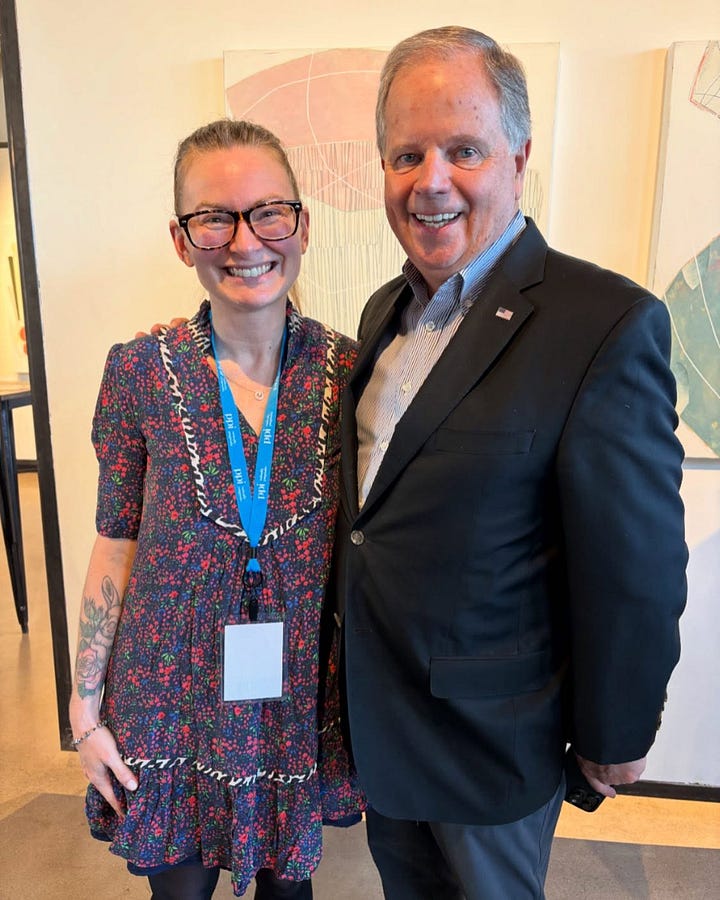I have a lot to say about the Progressive Policy Institute retreat I attended in Denver, Colorado this past weekend. The Colorado Governor’s Mansion is gorgeous. I looked good the whole time, but especially Friday.


Here’s the most important thing I can say: Fellow Democrats, please stop talking about welfare. Yes, that probably includes Medicaid.
We met to figure out how Democrats can win back the working class. So allow me to offer my bona fides on welfare and the working class. (French Latin is tres working-class coded.)
I only get along with people who were deeply humiliated about something as a child. For a large percentage of my political friends, it was growing up gay in homophobia-land. I was lucky enough to unaware of my bisexuality. For me, it was (among other things), getting food stamps and reduced price lunch. Republicans had little trouble convincing me that divorce and single motherhood caused poverty after we moved, post-divorce, from a big, nice house to a tiny, run-down one on a busy road that got burglarized.
Sometime between then and sitting on the Heritage Foundation panel in 2013 defending single moms, my feelings changed.
Today, I like welfare. Of course I support Medicaid expansion. Hell, I want a UBI. I think it’s embarrassing for the wealthiest country in the world to let people to go without basic necessities. I think victim-blaming is a thousand million times more embarrassing than ending up impoverished.
Before this weekend, I also really thought welfare was a winning issue for Democrats. After all, along with the Parties, the face of welfare and poverty have changed.
I mean Hell. For a hot second, red state governors were talking about expanding Medicaid. Now the GOP-led Congress is gearing up for big cuts.
The GOP of my childhood loved to moral panic about “welfare queens,” as if every welfare check went to a Black single mother in a big city who abused the system to avoid having to work.
Today, the parties are increasingly divided by education (therefore also by geography and gender). The face of public assistance has also become whiter and more rural/suburban. I thought I was witnessing a sea change in support for a functional social safety net.
Why hasn’t that materialized? I think there are two main reasons. First, the poorest people are the least engaged, politically. Second, (and the topic of today’s post) working class voters still don’t like welfare.
I mean, everyone wants whatever help they can get when they need it.
But these voters don’t want more big government programs, according to polling from PPI and David Shor.
would likely agree. Look at Bidenomics.Working-class voters have noticed that these programs boost inflation, taxes, and the deficit while rarely helping families permanently escape poverty.
At the retreat, David Shor said we are still vastly underrating the Democratic Party’s young male problem. The Democratic Party now only reliably wins college-educated women in superstar cities and swing districts. I would argue that “working-class voters” are actually prime-age, bottom-half men and the people who see how much their lives suck and want better for them.
Voters like you and me generally don’t see their lives. We don’t understand their perspective. We don’t want what they want.
Polling shows that they want work.
They want to get rid of degree requirements. They want more college alternatives. They want it to be easier to start a new business. They want immigrants to stop pushing wages down and taking opportunities. According to PPI, more than 80% of the wage gains during the Biden administration went to immigrant workers. They want jobs that pay enough to cover life’s basic necessities: healthcare, housing, energy, transportation, and food.
Young men are especially Republican because they most want to marry women but are least able to. They don’t believe welfare will help with that, probably mostly because it won’t.
First, most men don’t qualify for most public assistance.
Medicaid, for example, is 55% female and 44% male. This probably understates the sex split, though, because it includes children, who make up 38% of Medicaid enrollees. Sex differences are bigger in high-poverty states like Alabama and among employed recipients. Most EITC recipients are single parents. The vast majority of single parents are female.
Even if more men did receive Medicaid, it wouldn’t make them any hotter. Us ladies have a strong, revealed preference for men with college degrees. After that, we marry men with the highest wages and most steady employment.
Medicaid pays for 40% of US births. Public assistance makes it easier for impoverished women to avoid marrying loser men. Not being married to women might, interestingly, be making single bottom-half men into even bigger losers.
For the record, I think that it’s hard to argue that marriage is a great thing for bottom-half women and that we have to make the alternative to marriage literally starving to death to get women into it. Marriage actually isn’t that great for bottom-half women, and marriage stans should probably work on making it more attractive.
But in electoral politics, what I think simply does not matter. As long as the alternative remains insane Christian nationalist Nazi jihadi psychopath economy destroyers, I’m voting Blue no matter who.
To win, Democrats must persuade people who are very emotionally invested in their own idea of “family.”
I think “family” means whoever will drive you home from the hospital and help you pay rent and that the male breadwinner norm is outdated and economically unworkable long-term and that everyone should get a monthly check from the government just for existing.
Working class voters think “family” requires a breadwinner husband. Right now, there is a shortage of male breadwinners and a surplus of single, NEET, prime-age, bottom-half men. Democrats must internalize, post-haste, how much more of an emergency that is for them than it is for us.
At the retreat, over and over again the speakers stressed that the Democratic Party must begin listening to and respecting the wishes of the people we need to convince.
This means that candidates and campaigns must ignore people like me, except when I’m telling them about the people they won’t listen to directly.
“People like to psych themselves up by talking about how there’s no point in winning elections if we’re not going to stand up for our core values,
recently wrote. “But the converse is equally if not more true — there’s no point in articulating a policy agenda that stands no chance of being enacted.”Irritating pipsqueak, DNC Vice Chair, and symbol of Party priority fucked upedness David Hogg recently said of his effort to primary Democrats he thinks are too old and status-quo loving: “This moment requires us to have the strongest opposition party possible to stop Trump.” You know what makes for a strong opposition party? MAJORITIES, YOU STUPID FUCK.
Winning requires listening to people who think very differently than we do. I think there’s tremendous opportunity for people like us to listen especially hard when these voters talk about family, welfare, and work.







With the caveat that I think the political landscape is going to be vastly different from now on '26 and '28 and I think "look at those freaks" is a pretty winning message in the mean time, I think middle class people don't understand how important being better than welfare is important for non-poor conservatives. It's why we have to make so much effort to hide some of the biggest welfare programs in the tax codes or people have to believe they earned their Medicare and social security.
I also think substantively we really should have more welfare programs and services that protect men. Lots of the worse dudes could really use a therapist and a social worker! But the idea of getting such help makes men very angry. It's that paradox of masculine privilege.
Great piece! Very easy to project a kind of paternalist, working class solidarity cosplay onto the actual working class. Talking about their priorities, empirically, is a good call!